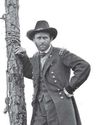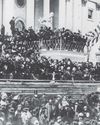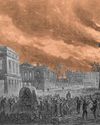
Among them was not having enough people, especially on its northern frontier. Mexico needed people to establish settlements and to develop the land. Where to get them was the question.
One answer was from its northern neighbor. In the three decades since the United States had adopted its own constitution, its population had doubled to almost 10 million. After the United States bought Louisiana from France in 1803, stories about the vast new territory pulled people westward. People also were pushed westward by crowding in the east and rising food and land prices.
Americans had already started to cross the Sabine River from Louisiana into Mexico. Some of them were poor squatters looking for free land. Some were pirates and smugglers on the wrong side of the law. Still others were military adventurers with wild plans for starting a new nation.
But those illegal immigrants were not what Mexico wanted.
TEXAS THROUGH THE YEARS
1521–1821 part of New Spain
1821–1824 part of the Mexican Empire
1824–1836 part of United Mexican States/Republic of Mexico
1836–1845 Republic of Texas
1845–1861 U.S. state
1861–1865 Confederate state
1870–present Restored to Union as U.S. state
Mexico passed its first colonization law in 1823. It provided for empresarios (agents) to recruit Catholic immigrants of any nationality to live in Mexico. The empresarios received rewards in the form of land. The law promised at least 177 acres of land to each farmer and 4,428 acres of land to each rancher. Newcomers did not have to pay taxes for six years. Married couples and self-supporting individuals could become citizens of Mexico in three years.
Denne historien er fra January 2020-utgaven av Cobblestone American History Magazine for Kids.
Start din 7-dagers gratis prøveperiode på Magzter GOLD for å få tilgang til tusenvis av utvalgte premiumhistorier og 9000+ magasiner og aviser.
Allerede abonnent ? Logg på
Denne historien er fra January 2020-utgaven av Cobblestone American History Magazine for Kids.
Start din 7-dagers gratis prøveperiode på Magzter GOLD for å få tilgang til tusenvis av utvalgte premiumhistorier og 9000+ magasiner og aviser.
Allerede abonnent? Logg på

Putting the Pieces Together
Americans needed to begin to put the past behind them, come together, and plan for the future in the spring of 1865. But Abraham Lincoln, the man best equipped to lead them and who had hoped to restore the country as smoothly and peacefully as possible, had been assassinated.

LAST SHOTS
The last Confederate forces in the Civil War didn’t surrender in the spring of 1865 or on a battlefield.

AND IN OTHER 1865 NEWS
A group of African Americans stop at the White House’s annual public reception on January 1, where they shake hands with President Abraham Lincoln.

A Plot to Kill President the
For several months, actor John Wilkes Booth’s band of conspirators had plotted to capture President Abraham Lincoln and hold him hostage in exchange for Confederate prisoners.

Let the Thing Be Pressed
In June 1864, Union Lieutenant General Ulysses S. Grant began a nearly 10-month campaign in Virginia.

HEALING THE NATION
President Abraham Lincoln took the oath of office for the second time on March 4, 1865.

A Helping Hand
The spring season is hard in any agricultural society. Plants and animals are too small to eat.

WAR SHERMAN-STYLE
As far as Union Major General William T. Sherman was concerned, the Civil War had gone on long enough.

PEACE TALKS
The fall of Fort Fisher made clear that the Confederacy’s days were numbered. Southerners were tired and hungry.

FORT FISHER'S FALL
Outnumbered Confederate soldiers inside Fort Fisher were unable to withstand the approach of Union troops by land and the constant Union naval bombardment from the sea.